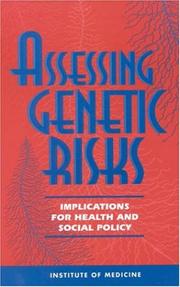| Listing 1 - 6 of 6 |
Sort by
|
Book
ISBN: 9188384306 Year: 1994 Publisher: Stockholm : Nerenius och Santérus,
Abstract | Keywords | Export | Availability | Bookmark
 Loading...
Loading...Choose an application
- Reference Manager
- EndNote
- RefWorks (Direct export to RefWorks)
Informed consent (Medical law) --- Patients --- Congresses. --- Legal status, laws, etc
Book
ISSN: 12817325 ISBN: 2257107357 9782257107350 Year: 1994 Publisher: Paris: Flammarion,
Abstract | Keywords | Export | Availability | Bookmark
 Loading...
Loading...Choose an application
- Reference Manager
- EndNote
- RefWorks (Direct export to RefWorks)
Informed Consent. --- Hepatitis B --- Hepatitis associated antigen --- Hemodialysis --- Congresses. --- Research. --- Ethics, Medical.
Book
ISBN: 9026513984 Year: 1994 Publisher: Amsterdam Swets & Zeitlinger
Abstract | Keywords | Export | Availability | Bookmark
 Loading...
Loading...Choose an application
- Reference Manager
- EndNote
- RefWorks (Direct export to RefWorks)
174 --- #KVHB:Hersenbeschadiging --- 616.8 --- Coma --- Familiebelasting --- Hersentrauma --- Patiëntenbegeleiding --- Revalidatie --- 606.1 --- beschut wonen (kleinschalig wonen) --- cerebrovasculair accident (CVA, hersenbloeding, hersenischemie, passagère cerebrale ischemie) --- cerebrovasculaire aandoeningen (beroerte) --- coma --- hersentrauma --- patiëntenbegeleiding (patiëntenvoorlichting) --- revalidatie --- stress --- Beroepsethiek. Beroepsmoraal. Deontologie van het beroep --- (zie ook: informed consent) --- 174 Beroepsethiek. Beroepsmoraal. Deontologie van het beroep --- #KVHB:Hersenbeschadiging. --- Beroepsethiek. Beroepsmoraal. Deontologie van het beroep.

ISBN: 158901300X 0585220689 9780585220680 9781589013001 0878405593 0878405607 9780878405596 Year: 1994 Publisher: Washington, District of Columbia : Georgetown University Press,
Abstract | Keywords | Export | Availability | Bookmark
 Loading...
Loading...Choose an application
- Reference Manager
- EndNote
- RefWorks (Direct export to RefWorks)
Free and informed consent is one of the most widespread and morally important practices of modern health care; competence to consent is its cornerstone. In this book, Becky Cox White provides a concise introduction to the key practical, philosophical, and moral issues involved in competence to consent. The goals of informed consent, respect for patient autonomy and provision of beneficent care, cannot be met without a competent patient. Thus determining a patient's competence is the critical first step to informed consent. Determining competence depends on defining it, yet surprisingly, no widely accepted definition of competence exists. White identifies nine capacities that patients must exhibit to be competent. She approaches the problem from the task-oriented nature of decision making and focuses on the problems of defining competence within clinical practice. Her proposed definition is based on understanding competence as occurring in a special rather than a general context; as occurring in degrees rather than at a precise threshold; as independent of consequential appeals; and, as incorporating affective as well as cognitive capacities. Combining both an ethical overview and practical guidelines, this book will be of value to health care professionals, bioethicists, and lawyers. Free and informed consent is one of the most widespread and morally important practices of modern health care; competence to consent is its cornerstone. This book provides an introduction to the key practical, philosophical, and moral issues involved in competence to consent.
Medical ethics. --- Capacity and disability. --- Informed consent (Medical law) --- Consent, Informed --- Consent to treatment --- Disclosure, Medical --- Medical disclosure --- Treatment, Consent to --- Consent (Law) --- Medical ethics --- Medical personnel --- Patient education --- Involuntary treatment --- Patient refusal of treatment --- Capacity (Law) --- Capacity and disability --- Disability (Legal incapacity) --- Incapacity (Law) --- Status (Law) --- Biomedical ethics --- Clinical ethics --- Ethics, Medical --- Health care ethics --- Medical care --- Medicine --- Bioethics --- Professional ethics --- Nursing ethics --- Social medicine --- Malpractice --- Law and legislation --- Moral and ethical aspects --- autonomie van de patiënt --- geïnformeerde vrijwillige toestemming (instemming) --- gezondheidszorg --- wilsbekwaamheid (wilsbekwame patiënten) --- autonomie du patient --- consentement libre et éclairé --- soins de santé --- capacité

ISBN: 0471942367 Year: 1994 Publisher: Chichester Wiley
Abstract | Keywords | Export | Availability | Bookmark
 Loading...
Loading...Choose an application
- Reference Manager
- EndNote
- RefWorks (Direct export to RefWorks)
Medical law --- Professional ethics. Deontology --- United Kingdom --- Informed consent (Medical law) --- -Sick --- -Right to die --- -Medical care --- -#GBIB:CBMER --- Delivery of health care --- Delivery of medical care --- Health care --- Health care delivery --- Health services --- Healthcare --- Medical and health care industry --- Medical services --- Personal health services --- Public health --- Death, Right to --- Death with dignity --- Natural death (Right to die) --- Death --- Life and death, Power over --- Advance directives (Medical care) --- Do-not-resuscitate orders --- Euthanasia --- Suicide --- Ill persons --- Persons --- Diseases --- Patients --- Consent, Informed --- Consent to treatment --- Disclosure, Medical --- Medical disclosure --- Treatment, Consent to --- Consent (Law) --- Medical ethics --- Medical personnel --- Patient education --- Involuntary treatment --- Patient refusal of treatment --- Legal status, laws, etc --- -Law and legislation --- -Decision making --- Malpractice --- Medical care --- Right to die --- Sick --- Decision making. --- Law and legislation --- Legal status, laws, etc. --- #GBIB:CBMER --- Decision making

ISBN: 0309047986 9786610196401 1280196408 0309585058 0585002177 9780585002170 9781280196409 6610196400 9780309585057 9780309047982 Year: 1994 Publisher: Washington, D.C. : National Academy Press,
Abstract | Keywords | Export | Availability | Bookmark
 Loading...
Loading...Choose an application
- Reference Manager
- EndNote
- RefWorks (Direct export to RefWorks)
Raising hopes for disease treatment and prevention, but also the specter of discrimination and "designer genes ", genetic testing is potentially one of the most socially explosive developments of our time. This book presents a current assessment of this rapidly evolving field, offering principles for actions and research and recommendations on key issues in genetic testing and screening. Advantages of early genetic knowledge are balanced with issues associated with such knowledge: availability of treatment, privacy and discrimination, personal decision-making, public health objectives, cost, financing and more. Among the important issues covered are quality control in genetic testing; appropriate roles for public agencies, private health practitioners, research laboratories and centers, and companies involved in testing; value-neutral education and counseling for persons considering testing; professional and public education; access to test results for insurance, employment, and other uses.
Medical genetics --- Human chromosome abnormalities --- Medical policy --- Probability --- Epidemiologic Measurements --- Organizations --- Cytogenetic Analysis --- Forensic Psychiatry --- Genetic Services --- Patient Rights --- Diagnostic Techniques and Procedures --- Communication --- Risk Management --- Investigative Techniques --- Health Surveys --- Causality --- Infant --- Laboratory Techniques and Procedures --- Genetic Techniques --- Psychology, Social --- Public Health --- Ethics --- Social Control Policies --- Diagnostic Services --- Persons --- Age Factors --- Diagnostic Techniques, Obstetrical and Gynecological --- Public Health Practice --- Genotype --- Age Groups --- Jurisprudence --- Medicine --- Insurance --- Congenital, Hereditary, and Neonatal Diseases and Abnormalities --- Organization and Administration --- Health Care Facilities, Manpower, and Services --- Sociology --- Biology --- Health Care Economics and Organizations --- Social Sciences --- Health Facilities --- Economics --- Health Care Evaluation Mechanisms --- Occupational Groups --- Mathematics --- Epidemiologic Methods --- Educational Measurement --- Weights and Measures --- North America --- Information Science --- Science --- Anthropology, Education, Sociology and Social Phenomena --- Data Collection --- Mathematical Concepts --- Behavior --- Behavior and Behavior Mechanisms --- Natural Science Disciplines --- Diseases --- Human Rights --- Policy --- Epidemiologic Factors --- Health Services --- Preventive Health Services --- Health Care --- Psychiatry --- Analytical, Diagnostic and Therapeutic Techniques and Equipment --- Diagnosis --- Named Groups --- Health Services Administration --- Quality of Health Care --- Financing, Organized --- Americas --- Health Care Quality, Access, and Evaluation --- Humanities --- Health Occupations --- Genetic Phenomena --- Biological Science Disciplines --- Environment and Public Health --- Disciplines and Occupations --- Geographic Locations --- Community Health Services --- Psychiatry and Psychology --- Behavioral Sciences --- Phenomena and Processes --- Geographicals --- Behavioral Disciplines and Activities --- Genetic Testing --- Infant, Newborn --- Informed Consent --- Reference Standards --- Risk Assessment --- Age of Onset --- Confidentiality --- Government --- Mass Screening --- Risk Factors --- Federal Government --- Genetic Counseling --- Government Regulation --- Human Experimentation --- Public Policy --- Risk --- Sex Determination Analysis --- Statistics as Topic --- Policy Making --- Prejudice --- Financial Support --- Health Personnel --- Social Control, Formal --- State Government --- Genetics, Medical --- Information Dissemination --- Minority Groups --- Prenatal Diagnosis --- Education --- Insurance, Health --- Minors --- Adolescent --- Genetics --- Health Policy --- Heterozygote --- Laboratories --- Research --- Voluntary Programs --- Biomedical Research --- Advisory Committees --- Information Services --- Professional Competence --- Chromosome Mapping --- Conflict of Interest --- Family --- Adult --- Epidemiology --- Genetic Diseases, Inborn --- United States --- Health & Biological Sciences --- Pathology --- Social aspects --- -Human chromosome abnormalities --- -Medical policy --- -#GBIB:CBMER --- genetische test (genetische zelftest) --- genetische screening --- genetische counseling --- genetisch onderzoek --- Health care policy --- Health policy --- Medical care --- Medicine and state --- Policy, Medical --- Public health --- Public health policy --- State and medicine --- Science and state --- Social policy --- Human chromosomes --- Chromosome abnormalities --- Genetic disorders --- Clinical genetics --- Heredity of disease --- Human genetics --- Medical sciences --- -Social aspects --- test génétique (autotest génétique) --- dépistage génétique --- conseil génétique --- recherche génétique --- Government policy --- Abnormalities --- Genetic aspects --- Hereditary Diseases --- Risk Factors. --- Social aspects. --- United States. --- epidemiology. --- genetics. --- Epidemiology. --- Genetics. --- #GBIB:CBMER --- Diagnosis&delete&
| Listing 1 - 6 of 6 |
Sort by
|

 Search
Search Feedback
Feedback About UniCat
About UniCat  Help
Help News
News